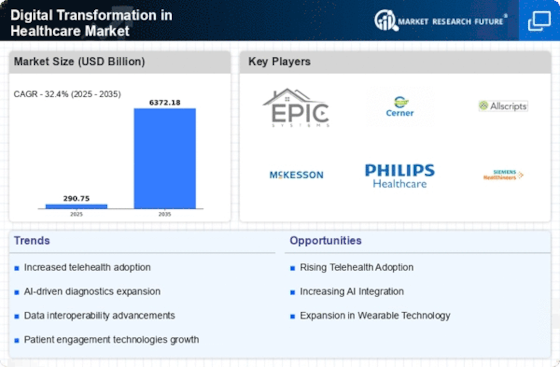Market Trends
Key Emerging Trends in the Digital Transformation Healthcare Market
The digital transformation in healthcare market is experiencing significant trends, driven by the ongoing integration of technology to enhance patient care, streamline processes, and improve overall healthcare outcomes. One prominent trend is the accelerated adoption of telemedicine and virtual care solutions. The global pandemic has accelerated the need for remote healthcare services, prompting healthcare providers to embrace telehealth platforms. Patients now have increased access to virtual consultations, remote monitoring, and digital health tools, transforming the traditional healthcare delivery model.
Interoperability is a key focus in the digital transformation of healthcare. As healthcare organizations adopt a variety of digital tools and systems, there is a growing demand for seamless data exchange between different platforms. The push for interoperability ensures that patient data can be shared securely and efficiently across various healthcare systems, improving coordination of care and providing a comprehensive view of a patient's health history.
Artificial intelligence (AI) and machine learning (ML) are playing a pivotal role in shaping market trends in digital transformation in healthcare. AI-powered tools are being utilized for diagnostics, predictive analytics, and personalized medicine. Machine learning algorithms analyze vast datasets to identify patterns and trends, aiding healthcare professionals in making more informed decisions and providing tailored treatment plans. These technologies are not only enhancing clinical decision-making but also contributing to the automation of administrative tasks, improving overall operational efficiency.
The rise of wearable devices and health apps is another noteworthy trend in the digital transformation of healthcare. Patients are increasingly using wearables to monitor vital signs, track fitness, and manage chronic conditions. This trend promotes patient engagement and empowers individuals to take an active role in managing their health. Healthcare providers are integrating data from wearables into electronic health records, enabling a more comprehensive and real-time view of patients' health status.
Data security and privacy are critical considerations in the digital transformation of healthcare. As more sensitive health information is digitized and shared across systems, ensuring the security and privacy of patient data becomes paramount. The market is witnessing increased investments in cybersecurity solutions, encryption technologies, and adherence to stringent regulatory standards to protect patient information and maintain the trust of both healthcare providers and patients.
The adoption of electronic health records (EHRs) is a foundational element of the digital transformation in healthcare. EHRs streamline the storage and retrieval of patient information, providing a centralized and comprehensive electronic record accessible to authorized healthcare professionals. This trend facilitates better coordination of care, reduces administrative burdens, and enhances patient safety by providing a complete and accurate view of a patient's medical history.
Patient-centric care models are emerging as a key trend in the digital transformation of healthcare. The focus is shifting towards personalized and patient-centered approaches, leveraging digital technologies to tailor treatment plans based on individual health data. This trend aligns with the growing recognition of the importance of addressing not only the physical health but also the overall well-being and preferences of patients.
Blockchain technology is gaining traction in healthcare for its potential to improve data integrity, security, and interoperability. Blockchain can provide a decentralized and tamper-resistant ledger for healthcare data, ensuring the integrity and traceability of information. This trend is particularly relevant in addressing challenges related to data exchange, secure sharing of health records, and maintaining the privacy of sensitive information.
The digital transformation in healthcare is fostering collaborative ecosystems and partnerships. Healthcare organizations are collaborating with technology providers, startups, and other stakeholders to leverage expertise and resources. These collaborations aim to accelerate innovation, implement digital solutions effectively, and address complex challenges in healthcare delivery.



















Leave a Comment